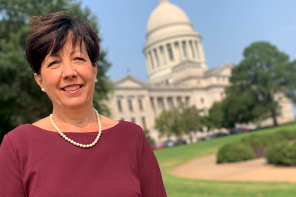In December 2008, Jenifer Dennis couldn’t believe that her family’s battle had been dragging on for a year. At the time, she’d expected it to be resolved by Christmas. Now another Christmas has passed and the case that began when her son came home from school with the mark of a cross burned into his arm seems no closer to a resolution.
Meanwhile, the Mount Vernon School District is a divided community in this rural section of south-central Ohio. And John Freshwater, the 8th-grade science teacher who admitted to using an electrostatic device known as a Tesla coil on Zachary Dennis’ arm, remains a polarizing figure at the center of the fray.
Despite the case’s layered subtexts much of the debate is over evolution.
Interestingly, one of the reasons for the divisiveness is that there appears to be no established version of events between the two sides. Depending on whom you talk to, this is either about a student being branded… or it’s about a Bible on a desk.
The story began in December 2007, after Zachary came home with a burn mark on his arm. Jenifer Dennis and her husband Steve complained to the school district after Zachary told them that Freshwater had asked him to volunteer to be part of a science experiment. The Dennises said the burn, which in photos [above, right] show an 8-by-4-inch mark on their son’s forearm, raised blisters, kept their son awake that night, and lasted for several weeks.
At first glance, they saw the mark as a religious emblem. But their first concern was less about religion and more about what they considered to be a case of a teacher injuring their son.
In response, the Dennises filed a federal lawsuit against Freshwater and the Mount Vernon School District, which is still three months away. However, in August, the school district, which had been named in the suit, settled with the family.
After the Dennises complained to the district, the school launched a lengthy independent investigation in which Freshwater, other teachers, students, and administrators were all interviewed. The consultant concluded in a report that Freshwater had been teaching students that evolution is a lie for at least 11 years.
The report said that Freshwater had witnessed to students, at one point telling them that there couldn’t possibly be a genetic link to homosexuality because the Bible says it is a sin. The report also said that he handed out Bibles to members of the Fellowship of Christian Athletes and led them in prayers during school hours.
It also said Freshwater had misused the Tesla coil during the science experiment.
Citing the findings, the district tried to fire Freshwater in July 2008. Alleging religious persecution, Freshwater fought back, filing a request with the Ohio Board of Education for a pre-termination hearing. Due to lengthy ongoing delays by Freshwater’s attorney, the teacher has not yet finished presenting his case before the state-appointed referee. The hearing has continued for more than a year and has cost the district more than a half million dollars.
He remains suspended without pay.
Brand v. Bible
Attacks against the teaching of evolution are not uncommon in small towns across America. But the grisly accusations and the extremism of some of Freshwater’s supporters have recently caught the attention of both the New York Times and the Guardian UK, both of which sent reporters to Mount Vernon recently. The Times piece highlighted the divide in the school district, which is flanked by two liberal arts schools, Kenyon College and Mount Vernon Nazarene University.
One of Freshwater’s move vocal supporters, Dave Daubenmire, is the creator of the town’s Minute Men United, a militant organization that endorses Christian theocracy. Two years ago, according to the Columbus Dispatch, Minutemen led protests at religious services of two local churches that embraced the gay community. Until the branding incident, Freshwater had been an active participant at Minutemen anti-abortion events.
Daubenmire has characterized the Freshwater case as a war and has accused the district superintendent Steve Short of doing the devil‘s bidding.
In a recent interview, Daubenmire said there has been a lot of misinformation in the news media about the case. “Everything you read is not true,” he told me. His primary objection to the New York Times article was that it said Freshwater admitted to burning Zachary Dennis.
The Times wrote:
Mr. Freshwater, who declined to be interviewed, has said he did not mean to burn a cross on any student’s arm. Instead, he said he intended to leave a temporary X on the skin using a device called a Tesla coil during a science demonstration. He says he had done that, with no complaints, hundreds of times in his 21 years as a teacher at Mount Vernon Middle School.
Daubenmire said that Freshwater had admitted using the Tesla coil on Zachary Dennis, as he has done to students for 20 years, but he denies that he burned him. “There is no proof that is his arm in the photo,” he said.
However, during the school district hearing last year, a mole on the arm in the photo was shown to match up to the mole on Zachary’s arm. Also, other students testified for both the defense and on behalf of the school district that Freshwater had put similar marks on their arms.
When I spoke to Freshwater a year ago for an article I wrote for RD, he also said he had used the Tesla coil on Zachary, but said he didn’t know whether it had left a mark at the time.
Still, Daubenmire maintains that Freshwater did not burn Zachary.
“That is not the arm of Zachary Dennis, or if it is, it was not a mark left by John Freshwater,” Daubenmire said.
When asked to clarify, Daubenmire at first denied he was accusing the Dennis family of lying. Then he accused them of being in it for money.
In August, the family reached a settlement with the school district. The board’s insurance company paid $115,500 toward the plaintiffs’ legal fees and $5,502 to the plaintiffs. The $5,500 was placed into a formal trust in Zachary’s name. His parents each received $1.
“This has never been about the money for us,” Jeni Dennis said. “That’s why we didn’t feel taking a lot of money from the school was appropriate.”
When asked whether it might be more plausible that Freshwater had inadvertently left a more serious burn on the student than he had intended, Daubenmire accused me of being biased and wanted to know whether I am a Christian. He said if the burn was as bad as alleged, school officials should have contacted Children and Youth Services.
“And they took no action on it,” he said. “Six months later, they bring up the Bible on the desk.”
“This goes far deeper than the Tesla coil,” he said. “This is about viewpoint discrimination.”
Critical Analysis
Nowhere in the Dennis’ initial complaint is a Bible on the desk mentioned.
“This was never about a Bible on his desk,” Dennis’ attorney Doug Mansfield said last week. “The beef the Dennises had was that their kid came home from school with a cross burned in his arm. They go to the school, they continue to talk to the school district, they found out more and more what Mr. Freshwater was doing in the classroom.”
According to the independent investigatory report, Freshwater at first denied the incident. Later he admitted to the experiment, admitting he marked Zachary with an X. However, students interviewed for the investigation all described it as a cross.
The link to the full report is here.
Before the district moved to fire him, Freshwater was first told to remove all religious items from his room, including a poster of the Ten Commandments hanging on the wall, stickers with scripture on them, extra Bibles he kept in the back of the classroom, and the Bible that he kept on his desk.
Freshwater, fearing disciplinary action, took his side of the story public. But he never mentioned the branding incident. Instead, he raised accusations of religious persecution. At a press conference, he said that the district told him to remove the Bible he kept on his desk. Because he refused, he told the crowd, administrators wanted to fire him.
Students organized a rally for him, bringing their Bibles to school in support. Several public rallies have been held in support as well.
Supporters also say the district is retaliating against Freshwater because he advocated for “critical analysis” of evolution in 2003.
“They’ve marked me as a religious—I don’t know if I want to use this phrase about myself—but as a religious fanatic,” Freshwater said to me a year ago.
Dick Hoppe, who lives in the community and has been covering the hearings for the science blog Panda’s Thumb, said Freshwater and his supporters have done an effective job at focusing the debate on the Bible, rather than the brand.
For many in the community, not only do they oppose the concept of separation of church, they’re not even aware of it. Lori Miller, a fellow teacher in the middle school, testified at the administrative hearing in March on Freshwater’s behalf.
Hoppe wrote the following account of her testimony:
Asked if she had encouraged students at school to embrace Christianity before the Freshwater affair began last year, she readily responded that she had done so. She gave examples in an excited voice. She had prayed over students in the halls and lunchroom, had counseled them to seek Christ, and so on. She said, “I honestly didn’t think that was wrong.” She was very enthusiastic in voice and manner about her proselytizing in the public schools.
Religious People
Tired of the comments made to their sons in school by students and being singled out by one teacher, the Dennis family put their house up for sale and moved to another district. Today, Zach is a sophomore and plays hockey.
“I just have to have the attitude that it’s never going to end,” Jenifer Dennis said. “Otherwise, it can drive you nuts.”
The lawsuit is an Establishment Clause case, arguing Freshwater violated Zachary’s First Amendment rights by proselytizing religion and teaching creationism in the classroom. But it also raises the separate issue of battery because of the cross burn, which, Mansfield notes, feeds back into the Establishment Clause issues.
Freshwater has filed a counterclaim against the Dennis family, as well as a separate lawsuit against the district, alleging religious discrimination, defamation, conspiracy, and breach of contract.
One of the truly weird things about out this case was that in the Dennis’ lawsuit, they felt the need to stress that they aren’t anti-religious—as if somehow their objection of a cross branded on their kid might be perceived that way.
“We are religious people,” they said in a statement after they filed suit in June. “But we were offended when Mr. Freshwater burned a cross onto the arm of our child. This was done in science class in December 2007, where an electric shock machine was used to burn our child.”
Dennis sighs on the phone when she thinks back on the past two years.
“It’s changed our lives,” she said. “But I think we just had to do what’s right for our son. He was wronged.”



